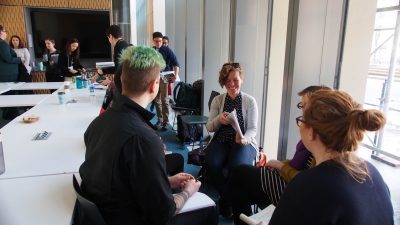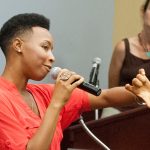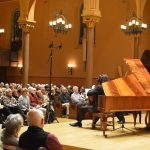
Graduate students from the Boston area gathered over breakfast Friday, as they kicked off a day-long conference in which they explored queer and feminist research methods. Boston University’s Women’s Gender and Sexuality Department hosted the day of discussions and workshops at the Rajen Kilachand Center for Integrated Life Sciences and Engineering.
The conference was created as an educational opportunity to share feminist and queer research methodology with graduate students who are working toward dissertations, said Catherine Connell, the director of the WGS Program and an organizer for the workshop.
“I conceived this event … drawing on the expertise of our own interdisciplinary faculty as well as three distinguished social scientists of gender and sexuality from other universities in the region,” Connell said.
Connell was joined by Evren Savci from Yale University, Angela Jones from Farmingdale State College and Piper Sledge from Bryn Mawr College on a panel of experts leading the workshop. The four of them also answered attendees’ questions in a roundtable Q&A session.
At the end of conference, graduate students could consult with the panel experts about their research proposals. Connell said this enabled them to immediately incorporate some of the theories and methods they learned from the conference into their papers.
Stuti Das, a first-year doctoral candidate studying sociology at BU, said she attended the workshop with the goal of gaining information that could benefit her own upcoming research. She said she was uncertain of what she specifically wanted her dissertation topic to be, but hoped to find inspiration at the conference.
“When I really get going on my own research, I’ll draw on some of the insights that I gained here today,” Das said.
Das said she wanted to get a sense of what other sociologists and students studying sociology were working on in hopes of learning from them and their research processes.
Nicole Peer, a second-year master’s student and graduate conference chair at the Frederick S. Pardee School of Global Studies, said she came to the workshop looking to gain new perspectives and methods to incorporate into her master’s thesis.
“I figured it’d be a good idea to see and learn and get feedback from more queer and feminist scholars, as a lot of the work that I’m doing right now is with international relations and political theorists,” Peer said. “So it’s a little bit different with how you approach it.”
Learning about the theories outside of the classroom was interesting, Peer said. The workshop helped her view queer and feminist work in a new way she said she believes will benefit her research in the future.
The conference was also a beneficial networking opportunity, Das said.
Connell said she believes education on queer and feminist research methods is important in the current changing social and academic climates.
“After many decades of resistance to feminist and queer scholarship in the academic mainstream, there are increasing opportunities for this scholarship to flourish,” Connell said. “At the same time, the need for such scholarship feels especially urgent in this particular political moment.”
According to Peer, workshops like this are beneficial for higher education as a whole because they welcome newly inclusive academia.
“Even when you have a liberal institution, they have tunnel vision,” Peer said. “I think [events like this] just open up a dialogue to create better, more holistic academic work and a more inclusive and welcoming environment on campus. It starts in the classroom.”
Bria Dunham, a program director of health science in Sargent College of Health and Rehabilitation Sciences and clinical assistant professor for health sciences, said the conference was a step toward spreading feminist and queer perspectives to more students and researchers.
Although she herself did not attend the event, Dunham said, she was grateful her department hosted it and looks forward to similar events in the future.
She said she hoped it would inspire attendees to use queer and feminist research methods in their future projects.
“There have been a lot of obstacles historically for women, for trans and non-binary individuals, for queer individuals, for getting involved in scholarship and research,” Dunham said.
Dunham said she wants to see such perspectives included not only in student research, but also among faculty. Besides workshops like Friday’s, she said an effective way of educating individuals on feminist and queer research methods is to incorporate them into the classroom through the professor.
“There is a lot of excitement and lively debate at the moment about these methodological approaches, queer methods in particular,” Connell said. “And I hope that Boston University and the WGS Program can be at the forefront of these discussions and the innovative research techniques they might stimulate.”




